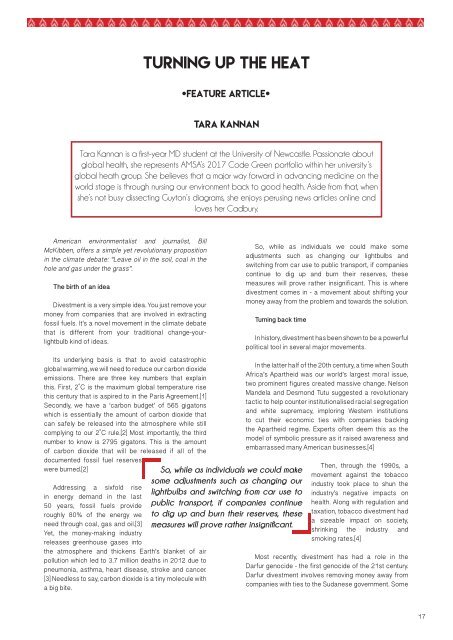Vector Volume 11 Issue 2 - 2017
You also want an ePaper? Increase the reach of your titles
YUMPU automatically turns print PDFs into web optimized ePapers that Google loves.
turning up the heat<br />
[Feature Article]<br />
Tara Kannan<br />
Tara Kannan is a first-year MD student at the University of Newcastle. Passionate about<br />
global health, she represents AMSA’s <strong>2017</strong> Code Green portfolio within her university’s<br />
global heath group. She believes that a major way forward in advancing medicine on the<br />
world stage is through nursing our environment back to good health. Aside from that, when<br />
she’s not busy dissecting Guyton’s diagrams, she enjoys perusing news articles online and<br />
loves her Cadbury.<br />
American environmentalist and journalist, Bill<br />
McKibben, offers a simple yet revolutionary proposition<br />
in the climate debate: “Leave oil in the soil, coal in the<br />
hole and gas under the grass”.<br />
The birth of an idea<br />
Divestment is a very simple idea. You just remove your<br />
money from companies that are involved in extracting<br />
fossil fuels. It’s a novel movement in the climate debate<br />
that is different from your traditional change-yourlightbulb<br />
kind of ideas.<br />
Its underlying basis is that to avoid catastrophic<br />
global warming, we will need to reduce our carbon dioxide<br />
emissions. There are three key numbers that explain<br />
this. First, 2˚C is the maximum global temperature rise<br />
this century that is aspired to in the Paris Agreement.[1]<br />
Secondly, we have a ‘carbon budget’ of 565 gigatons<br />
which is essentially the amount of carbon dioxide that<br />
can safely be released into the atmosphere while still<br />
complying to our 2˚C rule.[2] Most importantly, the third<br />
number to know is 2795 gigatons. This is the amount<br />
of carbon dioxide that will be released if all of the<br />
documented fossil fuel reserves<br />
were burned.[2]<br />
Addressing a sixfold rise<br />
in energy demand in the last<br />
50 years, fossil fuels provide<br />
roughly 80% of the energy we<br />
need through coal, gas and oil.[3]<br />
Yet, the money-making industry<br />
releases greenhouse gases into<br />
the atmosphere and thickens Earth’s blanket of air<br />
pollution which led to 3.7 million deaths in 2012 due to<br />
pneumonia, asthma, heart disease, stroke and cancer.<br />
[3] Needless to say, carbon dioxide is a tiny molecule with<br />
a big bite.<br />
So, while as individuals we could make some<br />
adjustments such as changing our lightbulbs and<br />
switching from car use to public transport, if companies<br />
continue to dig up and burn their reserves, these<br />
measures will prove rather insignificant. This is where<br />
divestment comes in - a movement about shifting your<br />
money away from the problem and towards the solution.<br />
Turning back time<br />
So, while as individuals we could make<br />
some adjustments such as changing our<br />
lightbulbs and switching from car use to<br />
public transport, if companies continue<br />
to dig up and burn their reserves, these<br />
measures will prove rather insignificant.<br />
In history, divestment has been shown to be a powerful<br />
political tool in several major movements.<br />
In the latter half of the 20th century, a time when South<br />
Africa’s Apartheid was our world’s largest moral issue,<br />
two prominent figures created massive change. Nelson<br />
Mandela and Desmond Tutu suggested a revolutionary<br />
tactic to help counter institutionalised racial segregation<br />
and white supremacy, imploring Western institutions<br />
to cut their economic ties with companies backing<br />
the Apartheid regime. Experts often deem this as the<br />
model of symbolic pressure as it raised awareness and<br />
embarrassed many American businesses.[4]<br />
Then, through the 1990s, a<br />
movement against the tobacco<br />
industry took place to shun the<br />
industry’s negative impacts on<br />
health. Along with regulation and<br />
taxation, tobacco divestment had<br />
a sizeable impact on society,<br />
shrinking the industry and<br />
smoking rates.[4]<br />
Most recently, divestment has had a role in the<br />
Darfur genocide - the first genocide of the 21st century.<br />
Darfur divestment involves removing money away from<br />
companies with ties to the Sudanese government. Some<br />
17

















